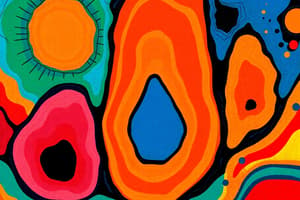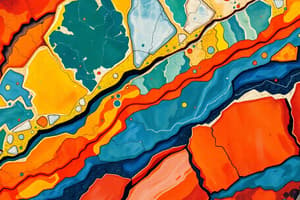Podcast
Questions and Answers
What is petrology?
What is petrology?
Petrology is the study of rocks and the processes that form and transform them.
What are rock forming minerals?
What are rock forming minerals?
Rock forming minerals are minerals that come together to form rocks, either by various minerals or rock fragments coming together or by a large number of accumulations of a single mineral.
What percentage of the weight of the continental crust do rock forming minerals represent?
What percentage of the weight of the continental crust do rock forming minerals represent?
Rock forming minerals represent more than 98% of the weight of the continental crust.
What are the three groups that rocks are broadly classified into?
What are the three groups that rocks are broadly classified into?
What is the rock cycle?
What is the rock cycle?
Rocks are assemblies of ______; it is formed by various minerals or rock fragments come together or consists of a large number of accumulations of a single mineral
Rocks are assemblies of ______; it is formed by various minerals or rock fragments come together or consists of a large number of accumulations of a single mineral
Rock forming minerals represent more than 98% of the weight of the ______ crust
Rock forming minerals represent more than 98% of the weight of the ______ crust
The rocks that make up the Earth's crust are the various minerals or single minerals, rock fragments, or both ______ and rock fragments
The rocks that make up the Earth's crust are the various minerals or single minerals, rock fragments, or both ______ and rock fragments
Magmatic rocks such as granite, gabbro, syenite are formed by ______
Magmatic rocks such as granite, gabbro, syenite are formed by ______
Marble, quartzite are formed by a single ______
Marble, quartzite are formed by a single ______
Study Notes
Petrology
- Study of rocks, their origins, formation, and mineral content.
Rock Forming Minerals
- Primary components of rocks that significantly influence their characteristics.
- Common examples include quartz, feldspar, mica, amphibole, and pyroxene.
Continental Crust Composition
- Rock forming minerals account for more than 98% of the weight of the continental crust.
Classification of Rocks
- Broadly classified into three main groups:
- Igneous
- Sedimentary
- Metamorphic
Rock Cycle
- Continuous process through which rocks transform between the three groups, involving processes such as melting, cooling, eroding, compacting, and transforming.
Composition of Rocks
- Rocks can be defined as assemblies of minerals and can consist of various minerals or rock fragments.
- Some rocks are primarily composed of a single mineral, known as monomineralic.
Formation Processes
- Magmatic rocks like granite, gabbro, and syenite are formed through the cooling and solidification of molten rock (magma).
- Marble and quartzite are examples of rocks formed from a single mineral, typically through metamorphosis.
Studying That Suits You
Use AI to generate personalized quizzes and flashcards to suit your learning preferences.
Description
Test your knowledge of Petrology and Rock-Forming Minerals in this quiz. Explore the different types of rocks and the processes involved in their formation and transformation. Learn about the role of rock-forming minerals and their abundance in various rock compositions. Challenge yourself and expand your understanding of these fundamental concepts in geology.




